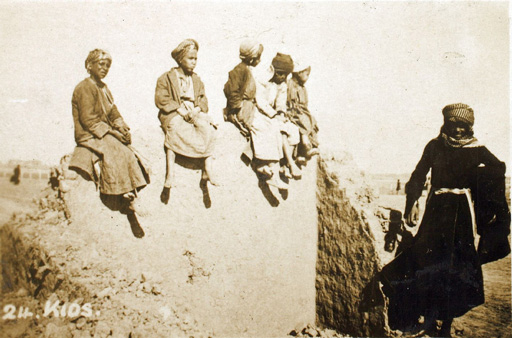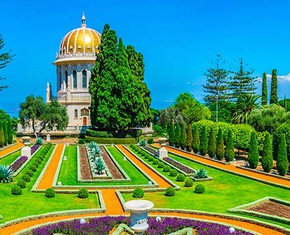The views expressed in our content reflect individual perspectives and do not represent the authoritative views of the Baha'i Faith.
O Son of Love! Thou art but one step away from the glorious heights above and from the celestial tree of love. Take thou one pace and with the next advance into the immortal realm and enter the pavilion of eternity. Give ear then to that which hath been revealed by the Pen of Glory. – Baha’u’llah, The Hidden Words, p. 24.
A stream of inspiring, mystical writings like these poured from the pen of Baha’u’llah almost continually in the years that he lived in Baghdad. His writings served to invigorate the little community of Babis. Yet as powerful as their effect was, Baha’u’llah’s personality and his presence had an even more profound impact, for an increasing number of people discerned the signs of a heavenly power in him.
Among the individuals upon whom Baha’u’llah’s personality and presence had a profound effect was Nabil, who would later emerge as the most eminent of the early historians of the Baha’i Faith. In a passage from his narrative of the early days of the Baha’i Faith, he gives an eyewitness account describing the joy and wonder that Baha’u’llah instilled in the hearts of the believers. His presence, and even his written words, transported them to such an extent that they became virtually oblivious to all else. Nabil, depicting the tumult that had seized the hearts of Baha’u’llah’s companions in the days prior to the declaration of His mission, writes:
Many a night would [Baha’u’llah’s amanuensis] gather them together in his room, close the door, light numerous camphorated candles, and chant aloud to them the newly revealed odes and Tablets in his possession. Wholly oblivious of this contingent world, completely immersed in the realms of the spirit, forgetful of the necessity for food, sleep or drink, they would suddenly discover that night had become day, and that the sun was approaching its zenith. – God Passes By, p. 152.
These friends and companions, like Baha’u’llah Himself, had very little in the way of material means. Yet they basked in the presence of their Beloved:
Many a night, no less than ten persons subsisted on no more than a penny worth of dates. No one knew to whom actually belonged the shoes, the cloaks, or the robes that were to be found in their houses. Whoever went to the bazaar could claim that the shoes upon his feet were his own, and each one who entered the presence of Baha’u’llah could affirm that the cloak and robe he then wore belonged to him. Their own names they had forgotten, their hearts were emptied of aught else except adoration for their Beloved. . . . O, for the joy of those days, and the gladness and wonder of those hours! – ibid, p. 137.
So intoxicated were those who had quaffed from the cup of Baha’u’llah’s presence,” wrote Nabil, “that in their eyes the palaces of kings appeared more ephemeral than a spider’s web. . . . The celebrations and festivities that were theirs were such as the kings of the earth had never dreamt of.” “I, myself with two others, lived in a room which was devoid of furniture. Baha’u’llah entered it one day, and, looking about Him, remarked: “Its emptiness pleases Me. In My estimation it is preferable to many a spacious palace, inasmuch as the beloved of God are occupied in it with the remembrance of the Incomparable Friend, with hearts that are wholly emptied of the dross of this world. – ibid, p. 137.
Among the many others who were profoundly influenced by Baha’u’llah was a learned man by the name of Isma‘il. Although very educated and accomplished in his own right, he was so impressed with Baha’u’llah that he could be seen every morning sweeping the doorway of Baha’u’llah’s house. This was his way of indicating the humility he felt in relation to Baha’u’llah and showing his appreciation of the loftiness of Baha’u’llah’s station. And this was before Baha’u’llah had proclaimed himself a Messenger of God.
Yet another devoted admirer was one Mulla Muhammad. He was an individual of outstanding learning and accomplishment. In the early days he noticed that Baha’u’llah, notwithstanding his noble lineage and high social rank, showed great humility, often serving the Babis tea and refreshments with his own hands. Considering his own attainments, Mulla Muhammad assumed that his knowledge was superior to that of all others, including Baha’u’llah. Because of this he took the place of honor in gatherings, speaking with authority on any and all issues.
One day, at a gathering in Baha’u’llah’s house, someone asked a question. Mulla Muhammad attempted an answer, during which the guests listened in silence. Baha’u’llah, who was serving tea, was the only person to make a comment from time to time. Gradually Baha’u’llah’s words came to dominate the discussion, while Mulla Muhammad grew silent. He later recalled:
His explanations were so profound and the ocean of His utterance surged with such a power that my whole being was overtaken with awe and fear. Spellbound by His words, I was plunged into a state of dazed bewilderment. After a few minutes of listening to His words—words of unparalleled wonder and majesty—I became dumbfounded. I could no longer hear his voice. Only by the movement of His lips did I know that He was still speaking. I felt deeply ashamed and troubled that I was occupying the seat of honour in that meeting. I waited impatiently until I saw that His lips were no longer moving when I knew that He had finished talking. Like a helpless bird which is freed from the claws of a mighty falcon I rose to my feet and went out. There three times I hit my head hard against the wall and rebuked myself for my spiritual blindness. – Taherzadeh, The Revelation of Baha’u’llah: Baghdad, p. 94.
Not all of the people who associated with Baha’u’llah were Babis, yet almost everyone who met and came to know him became an admirer. Eventually he became renowned in Baghdad and its environs for his learning and spiritual qualities. Some individuals were so moved by their experiences in his presence that separation from Him became extremely difficult to bear. One Persian nobleman, for instance, was so impressed that he designed for his own home an exact replica of Baha’u’llah’s reception area in the hope that this would allow him to recapture the joy he always felt when he visited there. Yet another nobleman was heard to state: “I cannot explain it, I do not know how it is, but whenever I feel gloomy and depressed, I have only to go to the house of Baha’u’llah to have my spirits uplifted.” Yet another person who became devoted to Baha’u’llah was the owner of a coffee shop frequented by him during these years. He was invited regularly to join Baha’u’llah for tea and became so attached to him that he came to consider any day in which he failed to visit him as wasted. After Baha’u’llah’s departure from Baghdad the man was so distraught that he was never again seen drinking tea, nor did he ever visit his own coffeehouse again.
You May Also Like
Comments


















We find that the AP Style usage guidelines have a positive impact on seekers. Because most seekers see many of the traditional Baha'i usage patterns as somewhat foreign--such as capitalizing pronouns that refer to Manifestations or accenting words in common English parlance--the more universally-seen and conventional AP Style tends to make seekers feel more comfortable when they first encounter written material on the Faith. In much the same way, the Universal House of Justice, when it wrote and published the Peace Statement in 1985, did not capitalize pronouns that referred to the Manifestations of God. In fact, in a letter to the US Publishing Trust dated 3 February 1975, the Universal House of Justice said: "Capitalization of pronouns relating to the Manifestations of God and to 'Abdu'l-Bahá in introductory books or books about the Faith in the English language is left to the personal choice of the author."